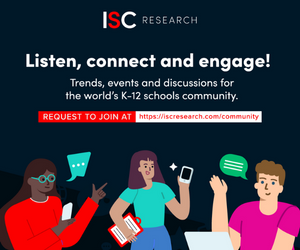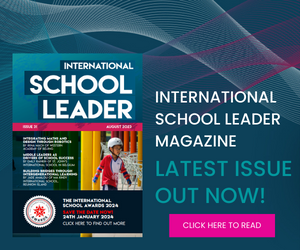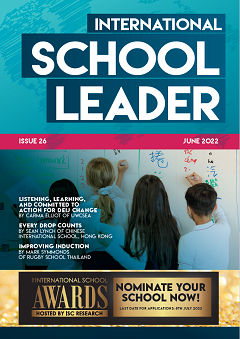By Alicia Torbado-Cordero and Soomin Park, written in collaboration with Justin Kearns
Upon returning to school in 2021, the American School of Paris (ASP) took much care to bridge academic gaps, yet in the social scene, awkwardness lingered as everyone had seemingly forgotten how to interact without a screen.
We, as students, decided to take it upon ourselves to compensate for the lack of socialisation. During one of our many discussions, we found ourselves off-topic, lamenting about how there had been no snow days that year, disappointing all our friends. That was when our faces collectively lit up and we realised we could give our peers the long overdue snow day with a fake one, aptly named ‘Faux Snow Day’.
With our peers being sandwiched between exams and pandemic stress, we wanted to offer a half-day of relief to revitalise relationships and build back our community. Our teachers’ well-planned calendar did not have room for this, but we didn’t back down and knocked, first on the door of our counsellor, then the high school principal, and finally the head of school.
With ‘Faux Snow Day’ being the first large-scale project led by students, there was an initial apprehension about whether students could truly pull it off. That hesitance only strengthened our commitment, and we used every form of presentation from speeches to mood boards to convince the school. Our efforts bore fruit as the school recognised our sincere dedication and gave us the chance to collaborate with ASP personnel in IT, facilities, parent–faculty association (PFA) and communications departments.
The continued hushed meetings led to an announcement in the form of a news broadcast by our student leaders dressed in ski apparel announcing the arrival of a freak snowstorm in April that left us with no choice but to stop school and simply have fun. The announcement ended with claps and cheers. The day was filled with live music played by students, accompanied by the whole school singing and dancing along, a burger food truck, snacks and games that created unforgettable memories. Our voices had come together to create a sunny day of smiles and laughs, one that students hadn’t been expecting and that we hadn’t seen for quite some time.
After having enjoyed a large-scale event that was completely designed and organised by students, many of our peers felt that they were not only being heard but being taken seriously. Students who saw the final event and realised the thought that went into it, took note of the power students can have, especially when working collaboratively.
The event was also shared online and in our school newsletter, and in every conversation student leadership was highlighted. This demonstrated to many in our community, be it parents, students or staff, the opportunities to create change within our school that have a lasting impact on both the student body and our school community as a whole.
Faux Snow Day shared a lot of similarities with other student agency opportunities such as the Curriculum Committee. This is a committee in our school led by educators that builds documents and policies which are then later implemented across the school. Examples of these include the Professional Growth and Feedback Model and the Assessment Guidelines.
In developing these, students’ voices were equally represented to ensure that these documents, which end up having large effects on students’ experience in the classroom, were successful. This entailed many fruitful conversations between adults and students that broke down barriers and not only built teacher–student rapport but opened both students and teachers’ minds to future collaboration.
This impact reaches far beyond the high school and the student leaders involved; it truly allows teachers to see the potential in their students outside of the classroom. It also allows students to appreciate the complexity and ‘messiness’ of the work that happens behind the scenes, and understand the operations of their school, which provides a new perspective. Through all these initiatives, trust is established which is what allows students to make change.
The success of Faux Snow Day built the student leaders’ credibility amongst the student community, faculty and leadership. It also demonstrated the benefit of involving student voices for greater ownership in these events. The sustainability of this event, having occurred two years in a row, also serves as a measure of its success.
In the second year, lessons from the first Faux Snow Day were incorporated and scepticism about its importance no longer existed as the community remembered the long-lasting impact the first event had on everyone’s wellbeing.
The credibility that was established helped us the following year when we launched an initiative to bring back a school lock-in that hadn’t been done in over a decade. From the very beginning, the school trusted us to plan events for our peers, approval was given swiftly, and within a week we were discussing details with the PFA. We were given even more control over decisions such as dates, decorations, activities and permission slips, and we were let in on every discussion.
Beyond the Faux Snow Day initiative, the wave of acceptance for student opinions allowed clubs and individual students to become less afraid to knock on doors and more willing to voice their opinions. The plethora of amazing student achievements around our school serves as evidence of this change and has pushed us to be creative thinkers and calculated risk-taking leaders. We were met with an inevitable challenge of pouring rain on this year’s Faux Snow Day. Yet, with the combined efforts of student leaders and faculty, we were able to pivot at the last minute with a plan that nonetheless left all students smiling in the rain.
Faux Snow Day encouraged the school administration to involve students more, grew our confidence as active contributors to our community and created change that will resonate through future generations of ASP students.

Photo: Sun model of co-agency
Takeaways for leaders
- Including students in the process of developing initiatives, especially related to bonding and forming relationships, increases student buy-in and shared ownership of the events
- Create space and opportunities for students to share ideas and provide them with the proper channels to pursue those ideas
- Instruct line managers to be receptive of student initiatives and ensure they help guide them in the process while educating them on the constraints
- Consistent feedback from adults is essential
- Celebrate successes and emphasise to your student body that these events were student-led; this will encourage students to come forward with more initiatives
 Alicia Torbado-Cordero
Alicia Torbado-Cordero
 Soomin Park
Soomin Park
 Justin Kearns
Justin Kearns
Alicia Torbado-Cordero and Soomin Park are students at the American School of Paris. This article was written in collaboration with Justin Kearns. Justin Kearns is the Upper School Dean of Students at the American School of Paris. You can connect with Justin directly on LinkedIn.



